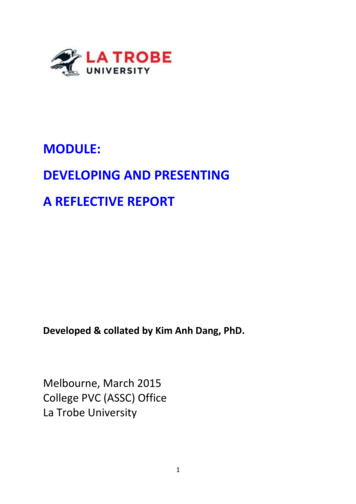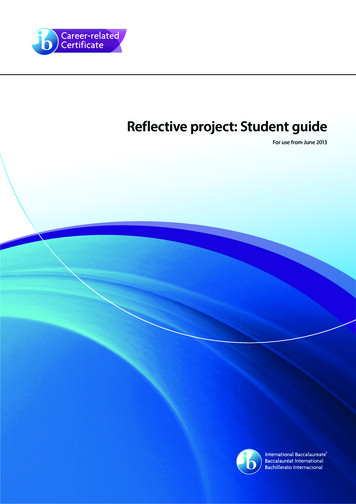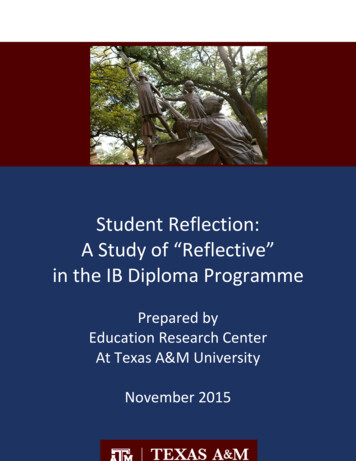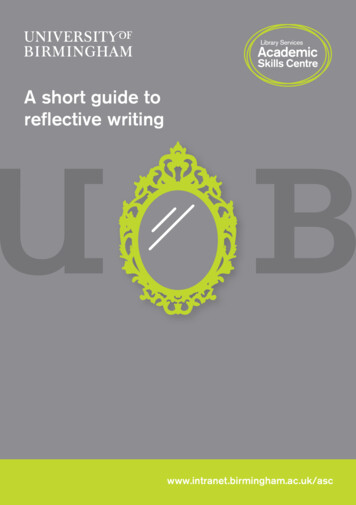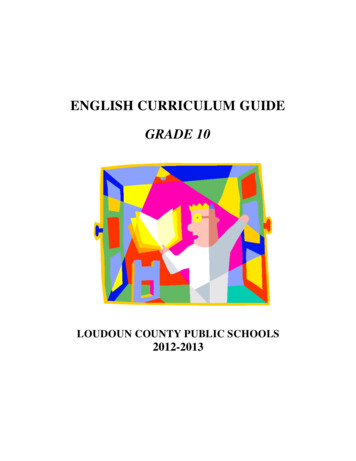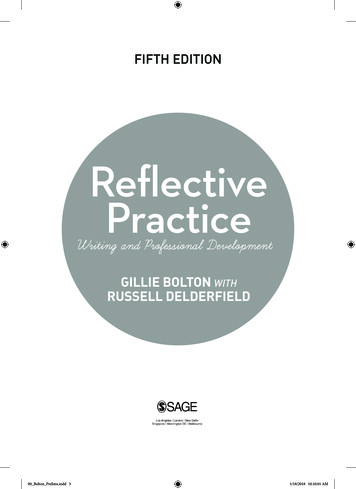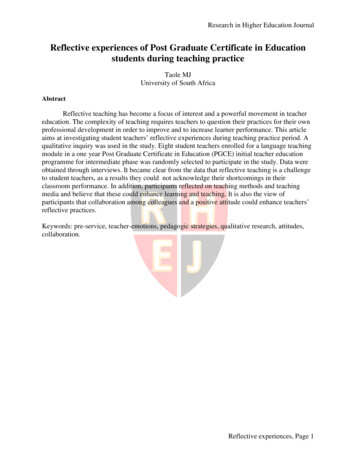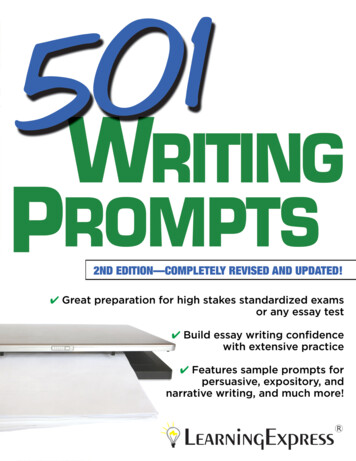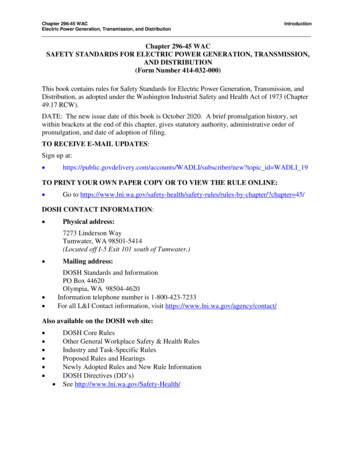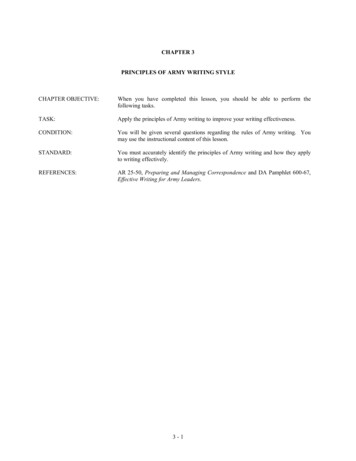
Transcription
Journals andReflective WritingAIMS OF THE CHAPTERReflective writing helps you make personal sense out of the rich, complex,and confusing information you are learning, ideas you are confronting, andpeople you are meeting. As the term implies, this writing is like a mirror,giving you an opportunity to look at your developing self. This personalconnection increases your motivation, purpose, and involvement by help ing you define what you want to learn and say. This chapter encouragesyou to explore both traditional forms of reflective writing and the new op portunities opened up by electronic communication.KEY POINTS1. Reflective writing is an opportunity to sort through learning and expe rience.2. Journals provide space for examining your readings and thoughts ingreat detail, following through on your observations in whichever waystrikes you as appropriate. When used as part of a course, journals helpteachers respond to your ideas.3. Electronic mail, bulletin boards, and discussion groups allow you to ex plore your interests and engage in informal communication with otherstudents in the class, the instructor, and other people who share yourinterests on campus and throughout the world.QUESTIONS TO THINK ABOUT What people, ideas, courses, readings, or other experiences have madeyou think new thoughts or wonder about new ideas? When and wheredo you think about these new experiences? What experiences have you had writing a journal? In what ways wasthe journal useful? In what ways did it seem forced or unnatural? What
Part Two Thriving in the Classroom73kinds of entries might best help you develop your feelings andthoughts about your reading and learning? Have you ever used the Internet? What subjects might you like to ex plore in Internet discussion groups or World Wide Web informationsources? /a A Rich and Confusing EnvironmentCollege is a new environment. You are probably surrounded by a wider va riety of classmates than you experienced in high school - students of differ ent ethnicities and nationalities; students of different economic and socialbackgrounds; students from more regions of the state, country, and theworld; students of more interests and accomplishments; older students re turning to school after varied experiences; and upperclassmen and graduatestudents with developed knowledge and commitments. Your professors willoften be deeply involved in their areas of specialization, in ideas they havepursued over time with their colleagues, and in projects that apply theirlearning to improving various aspects of life. The readings you have been as signed in your courses will introduce you to new subjects and to deeper lev els of understanding of subjects with wruch you are already familiar. Thebooks and journals in the library and the bookstores provide opportunities topursue ideas and learning on your own in directions not limited by the cur riculum.You also get to see special accomplishments and skills up close - the so ciology professor's ability to analyze how people relate to each other, the lit erature professor's ability to find the right expression, the philosopher'sability to cut to the heart of an argument, the architect's ability to conceive ofa graceful and useful building, the government professor's involvement instate policy making. Many of your classmates may also have abilities, skills,and knowledge you may admire- from the computer programming whizto the wrestling champion to the classmate who is just so witty. Seeing theseaccomplishments may open your eyes to new goals and lead you to reassessexactly where your best talents lie.How do you make sense of all you come in contact with and set some di rections for yourself? Some questions will sort themselves out spontaneouslyas you become involved in a heated discussion or suddenly want to do extrareading for a course that fascinates you. Some instructors may encourageyou to think about your reaction to what you are learning through discussionquestions and informal assignments. They may be available for you to talkwith outside of class, during office hours, or even over coffee. Informal talkwith your friends and classmates also helps you sort through all the newideas and experiences you are confronting.
14Chapter FourJournals and Reflective Writing /cJ Using Writing for ReflectionWriting can also be used to think through the meaning of experiences. Onetraditional method is to keep a journal where you consider the most puz zling, intriguing, or outrageous ideas you come across each day. E-mail dis cussion groups are another, newer way to try out ideas and write reflectively.Almost all colleges now have electronic mail capabilities that students canaccess from some terminals on campus once they establish an e-mail account.On some colleges access is extremely easy from anywhere on campus, and allstudents are preassigned e-mail accounts. Once you are on e-mail, you canfind discussion groups on many topics. Some of these are local to your cam pus, and others go worldwide. /cJ Journal WritingThe journal, even when it is assigned as part of coursework, allows you tostep outside the usual channels of class communication to reflect on ideas ina comfortable way. It creates a personal space for you to pursue thoughts andconnections, develop critical perspectives on your readings and lectures,make plans, and evaluate your goals with respect to projects, courses, andthe overall college experience.Teachers assign journals as part of their classes to encourage several sortsof reflection. They may want you to: Think about the ideas and information of the course and find what is rel evant to you See how the teachings of the course may be applied to your experi ences - such as how organizational theory explains what is going on inyour part-time job or how information from your zoology class helpsyou identify insects in the fields beyond the edge of campus. Criticize the divergent viewpoints presented in the course Indicate what you find most interesting or most difficult in the coursematerials, so that in class they can speak to the needs, interests, andthinking of you and your classmatesJournals are assigned in many kinds of courses. Although the journalprovides an alternative to usual classroom communications, instructors of ten relate journal assignments to other classroom communications, as in areading journal, a planning journal, or a personal connections journal. In aphilosophy course, for example, a journal to develop arguments about ques tions raised in class provides an informal opportunity to practice the kind ofphilosophic language that is being developed in the course and that you willhave to produce on exams and in papers. Because journals provide an infor mal space to explore ideas and reactions, you can use them to discover anddevelop ideas that you may want to develop in more formal papers. Thusjournals are one of the key tools of invention, as described on page 75.
Part Two75Thriving in the Classroom@./C)REVIEWING WRITINGPROCESSESInventionInvention is the art of finding what you want to say or write in any cir cumstance. Invention is particularly necessary in college writing,where your assignments often offer a wide range of possibilities thatyou have to narrow to a single issue. For this you need a well-chosen pa per topic.A successful paper topic balances several competing considerations.First, it must be original and creative enough to hold your teacher's inter est and set it apart from other students' papers. At the same time, it mustshow that you are familiar with the subject matter, and it must stick to thelimits set by the assignment. It must be complex enough to show substan tial thought yet not so complex that it cannot be covered in the assignedlength. Finally, it must interest you. The more important the subject is toyou, the more you will be committed to writing a strong paper.Finding a good idea is not always easy, but journal writing helps. Jour nal writing is one of the best tools for invention, for it allows you to turnthoughts over in your mind as you work through a course. When you aregiven a specific assignment, you can then look back in your journal forclues about topics that interested you that might fit the assignment. Youcan also use the journal to test possible ideas for the assignment and see, ina low-risk setting, where they might lead.Another way to explore a topic area is to "brainstorm," or to followloose, unstructured chains of association until you see connections you didnot see at first. For example, if you were given the assignment to write apaper on an important issue in elementary education today, you might be gin listing everything that came to mind when you thought of the wordschool, things such as teachers, blackboard, school buses, textbooks, and schoollunch. The last term, school lunch, might produce another chain of associa tions like the following: high prices, free lunch programs, students who needsupport. This might lead to a question that indeed raises a major issue forthe future of education: Will the learning abilities of students from poorImage removed for copyright reasons.
76Chapter FourJournals and Reflective Writingfamilies be hurt when child support and school support programs are cutback, and won't that impairment of learning help keep the students inpoverty?The primary purpose of a brainstorming session, whether alone orwith others, is to produce a large quantity of ideas -most of which willnever be used in a final paper. Many ideas that don't seem appropriate atfirst should still be put down because you can never know which ideaswill trigger associations that might ultimately be very productive. Aridiculous-sounding notion may well be a dead end, but it might also bethe starting point of a good paper topic.@./c)Three Students' Reading JournalsHere are three examples of journal entries written for an introductory philosophy course, all based on a single passage by Lao Tzu, a Chinese philosopher who lived in the sixth century B.C. In the first journal entry the studentconsiders the meaning of the text by examining the meaning of difficultphrases and sentences. In the second the student thinks about the singlephilosophic concept of opposites. The last entry is more personal and openended. Although all three take on different tasks, in each the student develops a fuller understanding of the passage and how it relates to his or her ownthinking.Here is the passage by Lao Tzu.The whole world recognizes the beautiful as the beautiful, yet thisis only the ugly; the whole world recognizes the good as the good,yet this is only the bad.Thus Something and Nothing produce each other;The difficult and the easy complement each other;The long and the short off-set each other;The high and the low incline towards each other;Note and sound harmonize with each other;Before and after follow each other.Therefore the sage keeps to the deed that consists in taking no action and practices the teaching that uses no words.The myriad creatures rise from it yet it claims no authority;It gives them life yet claims no possession;It benefits them yet exacts no gratitude;It accomplishes its task yet lays claim to no merit.It is because it ln.ys claim to no meritThat its merit never deserts it.From Tao Te Ching by Lao Tzu, trans. D. C. Lau (New York: Penguin, 1963) 58.
77Part Two Thriving in the ClassroomLao Tzu, founder of theChinese religion ofTaoism, was author ofthe Tao Te Ching.Image removed for copyright reasons.Journal Entry 1 (Finding the Meaning of the Text)This passage seems like a poem built on contradictionsand paradoxes. The problem in understanding this pas sage seems to be to see how these contradictions andopposites can make sense. Lao Tzu begins this passageby stating that what is seen as beautiful is reallyugly and that what is recognized as good is really"only the bad." While these statements seem confusingat first, his use of the phrase "the whole world recog nizes . . ." before both good and beautiful suggests thatthe world does not recognize true beauty or true good ness. Most people, he seems to say, do not have a cor rect idea of either morality or beauty, so we shouldnot trust their opinions or perceptions.Later, the author lists a series of opposites suchas "something and nothing," "difficult and easy," "long
78Chapter FourJournals and Reflective Writingand short," and "high and low." In very poetic fashion,he states that each of these contradictory terms issomehow involved in the other: "something and nothingproduce each other," "the long and the short off-seteach other," and so on. These paradoxes make us thinkabout how supposedly opposite things are actually simi lar. Long and short are both about length, and actuallythey help define each other, for without knowing what islong, how could you know what is short?Finally, Lao Tzu writes about a "deed that consistsin taking no action and practices the teaching thatuses no words." This mysterious deed is something thatgives life to "the myriad of creatures" yet "claims ndauthority"- something that "accomplishes its task" yetit "claims no merit." These final statements appear il logical because what kind of deed is not done and whatteaching has no words? It seems that this kind of mys terious deed is something he is recommending to us. Butit is also a puzzle as to what we should do. How can wefollow his recommendation if we don't take action?The three major parts of this passage contain threedifferent kinds of statements that illustrate the prin ciples of Taoism that we have been studying in class.The first part of the poem suggests that the majority ofpeople don't perceive reality correctly, the secondsuggests that things we consider opposite are actuallyconnected (like Yin and Yang), and the third suggeststhat we need to find a way of acting which does not tryto control situations, that blends into its surround ings. All of these points go along with the philosophyof Lao Tzu and illustrate some of the important princi ples at the heart of his teachings.Journal Entry 2 (Philosophical Interpretation)The assigned reading by Lao Tzu touches on a number ofthe philosophical questions we have been studying thisterm. One of the most important subjects he treats isthe nature of opposition. By including a series of op posite terms - such as something/nothing, difficult/easy,long I short, and high/low - and asking us to consider theway they are connected to each other, Lao Tzu forces usto reexamine our conception of what it means to be an"opposite." For Lao Tzu, opposites are not things thatare unrelated, as they are for most of us, but things
Part TwoThriving in the Classroomthat are closely related to and cannot exist withouteach other.As an example of this principle, we can look at theopposition between "cold" and "hot." We generally con sider these terms to be opposites, but, in reality,they can only have meaning in reference to each other.Something that is cold is something that is not hot,and vice versa. If we were to remove either of theseconcepts from our society, we would also have to removethe other, since, if nobody had any idea of what itmeant to be hot, they could not possibly understandwhat it means to be cold, since coldness is reallynothing more than the absence of heat.Maybe what Lao Tzu is trying to get across in thispassage is that, if we want to experience things inlife that we consider "good," we must also be willingto experience things that we consider "bad," since allof the concepts that make up this opposition depend oneach other. Many people think it would be nice to livein a world without cold, darkness, ugliness, falsehood,and evil. However, what Lao Tzu says to these people isthat, without these things, there could never be anywarmth, light, beauty, truth, or goodness.On the other hand, it may be that he thinks we aretoo concerned with either side of the opposites. Maybeit doesn't matter so much whether something is hot orcold or if it is beautiful or ugly, because each arealike, as he says. This would certainly fit with hisideas about not taking action and not using words. Thatis, we shouldn't try to make things one thing or an other, but just take them as they are.Journal Entry 3 (Personal Response)I found this passage by Lao Tzu to be very confusing.All of his talk about something being nothing and longbeing short seemed like a lot of philosophic mwnbo jwnbo. The last part of the poem, about something that"gives people life yet claims no possession" and "bene fits them yet exacts no gratitude" was even more confus ing, since it was difficult to understand what this "It"was. I had to read the whole passage three or fourtimes before I started to understand it at all, and I'mstill not sure that I have it right.79
80Chapter FourJournals and Reflective WritingBut, after I read it over and over again, I startedto see a few of the things that he seemed to be saying.In the first half of the poem especially, I think thatLao Tzu wants us to see that words like "difficult" and"easy," or "high" and "low" aren't always opposites . Infact, they are words that can refer to the very samething depending on who is speaking. For example, I amvery good at English and not very good at math, so whatis easy to me (like writing a paper) may be very difficult for someone else, and what is difficult for me(like balancing a checkbook) may be a snap for them.This difference does not mean that either one of us isright in our perceptions of what is hard or easy, justthat our perceptions are different.I can think of lots of times when I have used a wordin a way that seemed clear, only to find out that theperson I was talking to understood something very different. A lot of times, this kind of misunderstandingleads to arguments because one person wants to provethat their idea is the right one. I think that one ofthe most important things that Lao Tzu teaches us isthat perceptions can be different without anyone beingright or wrong.hinkingAboutStudentWriting1. What purpose does each student have in writing the journal entry?How do the purposes differ? Do the purposes in any way overlap orconverge?2. In each of the three journals, which terms or phrases do each of thestudents find most puzzling? Which do they find most revealing?How do the three students focus attention differently?3. What interpretation or conclusion does each student come to? Arethese conclusions similar or consistent? How do they differ? In whatway do the differences in conclusion arise from different purposes,different focuses of attention, and different ways of thinking aboutthe passage from Lao Tzu?In each journal entry, the personal reflection was framed by the readingassignment and the journal writing assignment. Within that assigned frame,students pursued their own ways of thinking about the ideas. As they sawwhat they wrote, they could recognize issues that concerned and puzzled
Part TwoThriving in the Classroom81them, which they might want to follow up on, and how and whether their in terest in philosophy was developing.The teacher, reading the journals later, responded by using student ex amples in class to create more engaging discussions, by moving the class dis cussion toward issues and concerns expressed by students, by suggestingreadings the s udents might find relevant, and by returning personal com ments to the journals. The journal changed the general dynamic of the class.The journal also provides a place for you to test out ideas that you mightuse in later, more formal assignments. If the instructor reads and commentson your journal, you can use the feedback to focus and develop your ideasfurther. You can even use the journal to ask the instructor to clarify the as signment or respond to your ideas. /cJ Guidelines for JournalsIn assigning journals, teachers usually discuss their expectations and mayprovide examples from previous classes. Beyond the formal or informalguidelines your teachers establish, consider the following general sugges tions for using journals:1. Write as though talking to yourself or a close friend. The more you findthe level of language that is closest to the way you think personally, the moreyou will be able to make the connection between what you are learning andthose ideas and experiences that are closest to you.2. Dare to be original - Dare to be stupid - Dare to get involved. Don'tcensor what you are thinking ahead of time. A direction that at first looks andfeels either outrageous or silly may turn into something quite focused, re spectable, and strong as you work through your ideas.3. Don't be afraid to argue. If your ideas begin with a negative reaction towhat you read, express that negative thought. The criticism may becomemore focused, fully developed, and forceful as you work through what youthink. You may find that your first negative reaction is only an initial resis tance that you overcome as you think through the reading, or that it is lead ing to an important idea in itself. In any case, since this is a personal journal,a candid expression of dislike will not immediately require you to get in volved in a major public debate. Moreover, in the academic world argumentand disagreement are not necessarily insults or rudeness; they can be ways ofcooperating in making ideas better and advancing knowledge.4. Make connections to other ideas, personal experiences, other courses, andreadings. Specific examples and more general ideas can help illuminateeach other. As you see how one idea or experience relates to another, youstart to expand your understanding of both things. Through comparisonsyou can start to see more details in both and distinctions between the two.You can find general patterns or conceptual links. You may start seeing how
82Chapter FourJournals and Reflective Writingeven more ideas and experiences may be connected to create a broader visionof the subject.5. Try new ways of saying things. Find ways to discuss what you arereading, experiencing, or thinking that differ from your previous ways ofwriting. You will then see events in different perspectives and make moreconnections among ideas. A useful approach is to put material in differentframes, as in describing a historical event in legal terms. Or you could de scribe the feelings of a character using a sentimental, emotional vocabularythat the character uses, but which is totally alien to you. There are manyother interesting ways of saying things. You can make lists of political strate gies described in different campaigns in different parts of the textbook, ordraw diagrams showing how two species of plants might have similar leafstructure. Varied kinds of representations may help tap more deeply intoyour way of thinking and may provide novel ways for you to expand yourthoughts.6. Keep your pen moving. Since a journal is not a formal public presenta tion, you don't need to worry if everything makes sense or is stated well.Keep on writing, even if you feel you have little to say. As your pen moves,one word may lead to another, one thought may touch off a deeper or moreinteresting one. Don't let temporary breaks or distractions break your mentallink with the ideas unfolding on the journal page. Trust the process of writ ing.7. Follow through on your thoughts and keep extending them. It is easy onceyou have an interesting idea to step back, admire it, and say that's enough fortoday. But an idea identified in a few sentences or a paragraph may be theopening to something much bigger and broader, so stopping after your firststatement will not take you as far as you may be able to go. Find ways to con tinue with the thought. Perhaps you might explain each part in greater detail,find an instance where the idea would apply, or locate a good example of it.You could compare it to some alternate point of view. You can ask where theidea specifically links up with the things you have been reading. If you findyourself stuck on how to expand your idea, make up an appropriate questionand then try to answer it.8. Read back in the journal, reflecting on what you have thought and how youare using the journal. This reflection will lead you to explore your thoughtsin greater depth, see patterns, locate areas of interest you want to explore, re member your best ideas, and use your journal even more effectively. Youmay then want to make a new entry commenting on what you found.9. Make writing the journal a regular habit. If you set a time every day forwriting journals, you will get better at it. Thoughts will come. You will alsocome to pay attention to the stray relevant thoughts that occur in the courseof the day, as you say to yourself, "I have to remember that for when I writemy journal tonight."You may, of course, keep a journal even when none is assigned. Since itis time-consuming to keep up with a journal every day in every course, you
Part Two83Thriving in the Classroommight want to keep a single journal, writing about whichever course or ex perience each day is most on your mind. Or you may choose to keep journalsfor those one or two courses in which you are most involved. By articulatingyour ideas and being able to look them over on paper, you will be able to takethem farther. Moreover, you will have more developed things to say in class,and you may want to speak to the teacher after class about some thought youare developing in your journals. Teachers generally respond positively to anystudent interested enough in their course to keep a journal.Another approach is to target a single course in which you are havingdifficulty getting involved. By keeping a journal, you may start to find a wayto become more interested. You may figure out just why you don't find muchin the course or have trouble with it. Then you can use this knowledge to ad dress and, perhaps, resolve the problem. /CJN EWSF R O MT H EFIEL DRichard Rodriguez's Reading JournalIn his autobiography Hunger of Memory, Richard Rodriguez describeshis early attempts at reading and writing about the great classics of lit erature. Though he did not know it at the time, young Rodriguez wasusing many of the strategies of the reading journal in his early childhoodeducation. Even though his early approaches to reading later seemed tohim a bit naive, his reading notebooks gave him the chance to express anddevelop his thoughts about his reading. As he started to sense that therewas more to reading than he was able to express, looking back on his earlyjournals helped focus his dissatisfaction and drive him on to find more ma ture ways of understanding. After all, only by recognizing that there wassomething more to his reading than he was able to say could he challengehimself to deeper views.Excerpt removed for copyright reasons.
84Chapter FourJournals and Reflective WritingExcerpt removed for copyright reasons.From Richard Rodriguez. The Hunger of Memory: The Education of Richard Rodriguez (NewYork, Bantam, 1982) 62.JOURNALS FOR YOUR SELF, JOURNALSFOR YOUR COURSES1. For two weeks keep a daily journal about the interesting, admirable,or odd things you come across in college. You may comment on peo ple, ideas that occur to you, ideas and information from assignedbooks, comments from teachers or classmates, or anything else thatattracts your attention.2. Select one of your courses in which you do a substantial amount ofreading. For two weeks keep a journal in which you respond to ideasand information you come across in that reading. Try to connect thereading material with ideas, concerns, or experiences you have hadoutside the course.3. The following passages all reflect on the role of reading and learningin people's lives. Use them to prompt your own thoughts about yourown experience. Write a journal entry on one of the following pas sages about learning and literacy.
Part TwoThriving in the ClassroomA. From Mike Rose, Lives on the Boundary (New York: Free Press, 1989).Mike Rose, a noted teacher of writing, describes his own uninspiring ex perience as a student in an unchallenging situation.Excerpt removed for copyright reasons.B. From The Autobiography of Malcolm X (New York: Penguin, 1968).Mal colm X describes how he got his real education through reading when hewas in prison for armed robbery.My alma mater was books, a good library.Every time I catch aplane, I have with me a book that I want to read -and that's alot of books these days.If I weren't out here every day battlingthe white man, I could spend the rest of my life reading, just sat isfying my curiosity -because you can hardly mention anythingI'm not curious about. I don't think anybody ever got more out ofgoing to prison than I did. In fact, prison enabled me to study farmore intensively than I would have if my life had gone differ ently and I had attended some college.I imagine that one of thebiggest troubles with colleges is that there are too many distrac tions, too much panty-raiding, fraternities, and boola-boola andall of that. Where else but in prison could I have attacked my ig norance by being able to study intensely sometimes as much asfifteen hours a day? (275)85
86Chapter Four Journals and Reflective WritingC. From Alan Bloom, The Closing of the American Mind (New York: Simon& Schuster, 1987). Alan Bloom complains that students today are harmedby not being exposed to the great thinkers. As a result they are left to gettheir ideas from popular entertainment.Lack of education simply results in students' seeking for enlight enment wherever it is readily available, without being able to dis tinguish between the sublime and trash, insight and propaganda.For the most part students turn to the movies, ready prey to in terested moralisms such as the depictions of Gandhi or ThomasMoore - largely designed to further passing political move ments and appeal to simplistic needs for greatness - or insinuat ing flattery of their
Almost all colleges now have electronic mail capabilities that students can access from some terminals on campus once they establish an e-mail account. On some colleges access is extremely easy from anywhere on campus, and all students are preassigned e-mail accounts. Once you are on e-mail, you
